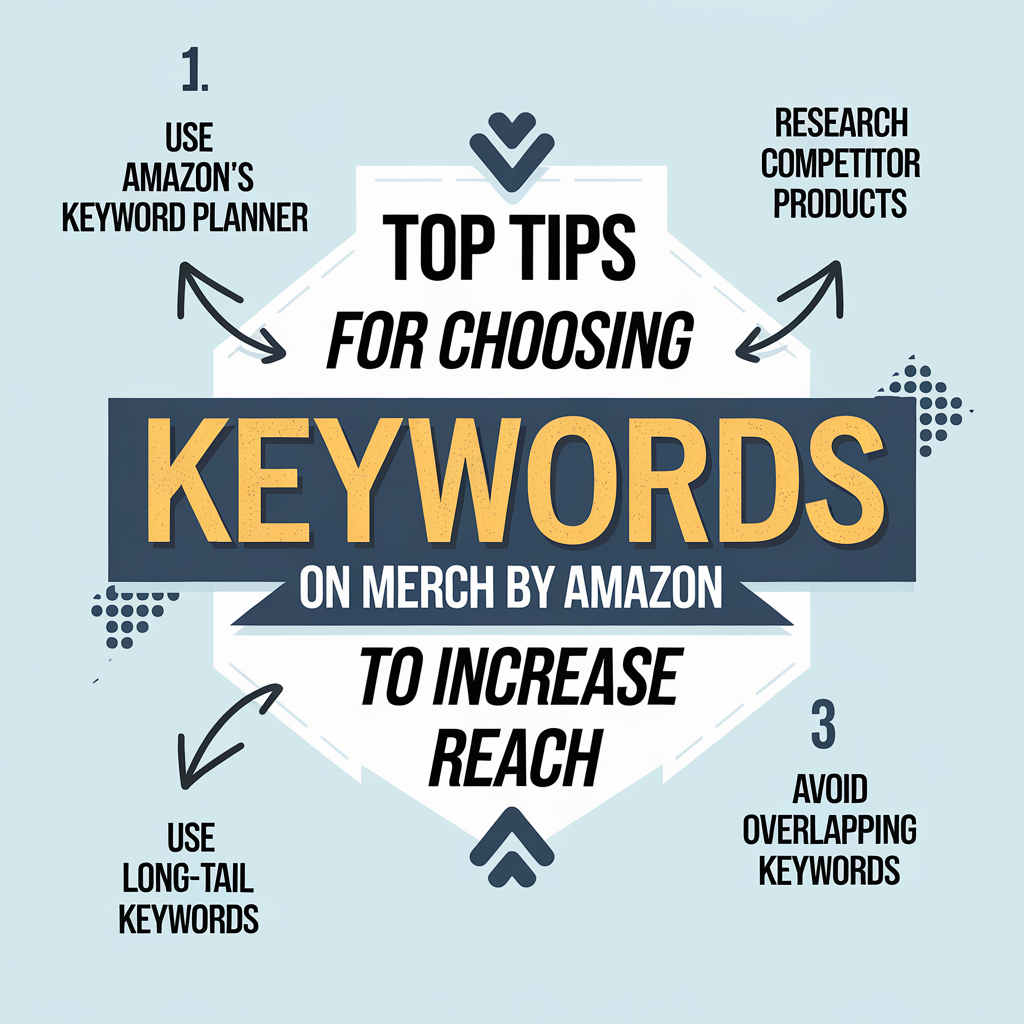
Table des matières
Introduction
Merch by Amazon has become a powerful platform for creatives and entrepreneurs looking to sell custom-designed T-shirts and apparel online. However, success on the platform heavily depends on visibility, which is largely determined by your keyword strategy. Choosing the right keywords can significantly increase your reach and help your products stand out in a crowded marketplace. This article explores essential tips for selecting keywords on Merch by Amazon to maximize your visibility and drive sales.
2. Importance of Keywords
Understanding Keywords
Keywords are the words or phrases users type into the search bar when they’re looking for products. They serve as a bridge between what a customer wants and what you’re offering.
Why Keywords Matter in Merch by Amazon
On Merch by Amazon, keywords are vital for getting your products found by customers. The platform’s algorithm prioritizes products based on their relevance to user searches, and keywords are the primary way to communicate relevance.
3. Researching Keywords
Using Amazon’s Search Suggestions
A quick and easy way to discover relevant keywords is by typing into Amazon’s search bar. The autocomplete suggestions offer insight into popular and trending searches related to your products.
Competitor Analysis
Looking at the keywords your competitors are using can offer valuable insights. Study their product titles, bullet points, and descriptions to see what’s working in your niche.
Using Keyword Tools
There are several tools, such as Merch Informer, Jungle Scout, and Helium 10, that provide keyword research specific to Amazon. These tools can help you discover high-ranking keywords to incorporate into your listings.
4. Types of Keywords
Short-Tail vs Long-Tail Keywords
Short-tail keywords are more general (e.g., « T-shirt »), while long-tail keywords are more specific and descriptive (e.g., « funny cat T-shirt for women »). Long-tail keywords tend to have lower competition and attract more targeted customers.
Niche-Specific Keywords
Targeting niche markets with specific keywords can lead to better visibility. For example, if your T-shirts cater to a vegan audience, use keywords like « vegan lifestyle T-shirt. »
Seasonal and Trend-Based Keywords
Stay updated on trending topics and seasonal events. Keywords related to holidays, pop culture, or current trends can give your products a visibility boost during specific times of the year.
5. Optimizing Product Listings
How to Use Keywords in Titles
The title is the most critical part of your product listing. Make sure to include the main keyword early in the title to ensure it gets maximum attention from Amazon’s search algorithm.
Keyword Placement in Bullet Points
Amazon allows you to list key product features in bullet points. Here, you can place secondary keywords and provide further details about the product, using natural language that appeals to the reader.
Optimizing Product Descriptions
The product description should expand on your bullet points, providing a detailed and compelling narrative. Use a mix of primary and secondary keywords here, but focus more on storytelling to convince the buyer.
6. Avoiding Keyword Stuffing
Why Overusing Keywords Hurts Visibility
While it’s essential to use keywords, overstuffing your product listing with them can hurt your ranking. Amazon’s algorithm penalizes listings that appear unnatural or spammy.
How to Balance Keyword Density
Keep your keyword density balanced by ensuring the content reads naturally. Use keywords where they fit logically, but don’t force them into every sentence.
7. Tracking and Adjusting Keywords
Analyzing Performance
Once your products are live, track the performance of your keywords. Use analytics tools to see which keywords are driving traffic and sales.
A/B Testing Keywords
Experiment with different keywords by changing them periodically and tracking results. A/B testing will help you identify which keywords generate more sales and visibility.
Keeping Up with Trends
The online marketplace is always evolving. Stay updated on the latest trends in keywords by researching your niche regularly and adjusting your listings accordingly.
8. Expert Insights and Case Studies
Successful Merch by Amazon Sellers
Many successful sellers have shared their stories on how keyword optimization improved their sales. Learn from their experiences and apply those lessons to your own listings.
Case Study: How Optimized Keywords Boosted Sales
In a case study, a seller targeting niche markets with specific long-tail keywords saw a 50% increase in sales over six months. They achieved this by focusing on unique keywords that aligned with customer intent.
9. Future of Keywords on Merch by Amazon
The Role of AI and Automation
Artificial intelligence is increasingly playing a role in keyword optimization. In the future, AI-powered tools may help sellers identify the best keywords with more accuracy.
Adapting to Algorithm Changes
As Amazon continues to refine its algorithms, staying adaptable is key. Monitor changes and adjust your keyword strategies to stay ahead of the competition.
10. Conclusion
Choosing the right keywords is crucial for success on Merch by Amazon. By researching keywords, optimizing your product listings, and staying updated with trends, you can increase your visibility and boost your sales. Start by focusing on long-tail keywords, avoid keyword stuffing, and constantly refine your strategy for the best results.
